10 Best Skool Alternatives for Modern Training Communities (2026)

TL;DR
- What it enables: Modern training platforms enable scalable, personalized learning experiences with integrated community features and automated workflows.
- What it includes: AI-powered tools, white-label branding, learning management systems, community forums, analytics, and seamless integrations.
- Key elements: Personalization capabilities, automation efficiency, integrated communication tools, robust analytics, and scalable architecture for growth.
- Top alternatives for 2026 include: Disco, Mighty Networks, Kajabi, Circle, Teachable, Podia, Discourse, TalentLMS, Slack, Discord.
- Why it matters: Advanced platforms create richer learning experiences, reduce operational overhead, and support business growth beyond basic limitations.
What to Know Before Exploring Skool Alternatives
Skool provides a straightforward structure for managing communities and delivering courses, but its simplicity has its trade-offs. For training businesses looking to grow, features like advanced branding options, integrated tools for learning management, and AI-powered capabilities are becoming essential.
When considering alternatives, it’s helpful to focus on platforms that combine beautiful design, engaging community features, and smart automation tools. These features not only save time but also allow you to create richer, more personalized experiences for your learners, helping your programs stand out and succeed.
Key Criteria for Modern Training Communities
Building a training community today requires more than just a platform — it demands tools that create meaningful, seamless learning experiences. At the heart of any great training community is personalization. Learners thrive when content is tailored to their unique needs, whether through customized paths, role-specific materials, or adaptive pacing. Personalization isn’t a bonus; it’s an expectation.
Efficiency is equally important. Automated enrollment flows and scheduling not only save time but also reduce the friction that often comes with managing multiple cohorts. AI amplifies this by handling repetitive tasks, ensuring that learning programs can scale without overwhelming team resources. The result? More time to focus on strategy and learner engagement.
Connection drives community, which is why integrated video and communication tools are non-negotiable. Whether it’s live Q&A sessions, collaborative workshops, or small group discussions, having everything in one place keeps learners engaged and eliminates the need to juggle multiple platforms. Pair this with robust analytics, and program leaders gain a clear, actionable view of what’s working — and where there’s room to refine.
Key Insights for Choosing a Skool Alternative in 2026
Skool offers simplicity for managing communities and courses, but its lack of advanced customization and AI-powered features can limit scalability. For those seeking a platform that supports modern training communities with smarter tools, here’s a comparison to guide your decision-making.
| Skool Advantages | Skool Limitations | Features To Look For When Considering Skool Alternatives |
|---|---|---|
| Streamlined Simplicity: Easy to set up and manage. | Limited AI Tools: Lacks advanced automation and personalization features. | Robust AI-powered tools for automation and personalized learning. |
| Affordable Pricing: Flat $99/month with low transaction fees. | Basic Customization: Limited branding and design flexibility. | Advanced white-label branding and customizable learning paths. |
| Community Focus: Strong forum-style structure for engagement. | No Advanced LMS: Missing comprehensive learning management features. | Integrated LMS with learner progress tracking and analytics. |
| Unlimited Courses: Supports numerous courses without additional cost. | Scaling Challenges: Not ideal for larger or rapidly growing communities. | Scalable features for large and diverse training communities. |
| Straightforward Monetization: Simplified membership and payment options. | Lacks Integrations: Few integrations with external tools or workflows. | Seamless integrations with tools like Zoom, Slack, and payment systems. |
1. Disco
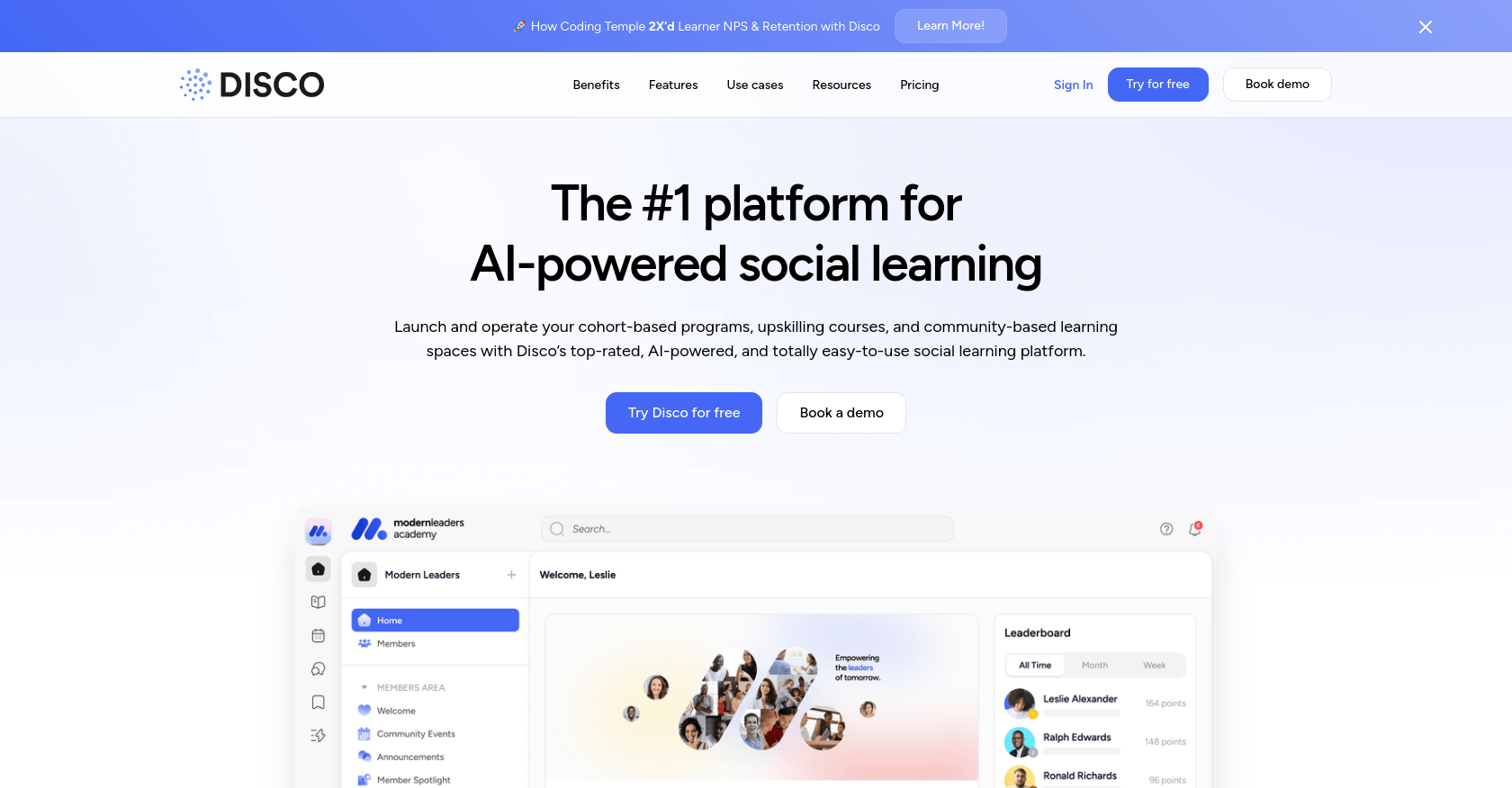
Overview
Disco is built to reshape how training businesses operate, offering a seamless platform that combines learning, community, and operations into one cohesive experience. It’s designed to simplify the complex, allowing organizations to focus on creating meaningful, branded learning journeys. From running live events to managing payments, every feature is carefully crafted to help leaders deliver experiences that are engaging, scalable, and effortless to manage.
Disco doesn’t just bring tools together—it creates a space where courses, communities, and operations flow naturally, empowering teams to deliver impactful programs without the typical hurdles of fragmented systems.
Key Features
Disco’s AI tools are at the heart of its innovation. AI-assisted course building simplifies program creation, helping you move from idea to execution faster than ever. Its community tools, including discussion spaces, leaderboards, and direct messaging, are designed to foster engagement and connection at every step.
Customization is effortless with white-label branding, making it easy to reflect your organization’s identity. Operations are streamlined with features like automated certificates and event reminders, while integrations with Zoom, Slack, and Stripe ensure your existing workflows stay intact. For insights, Disco’s analytics for learner progress provide actionable data, letting you continuously refine and improve your offerings.
2. Mighty Networks
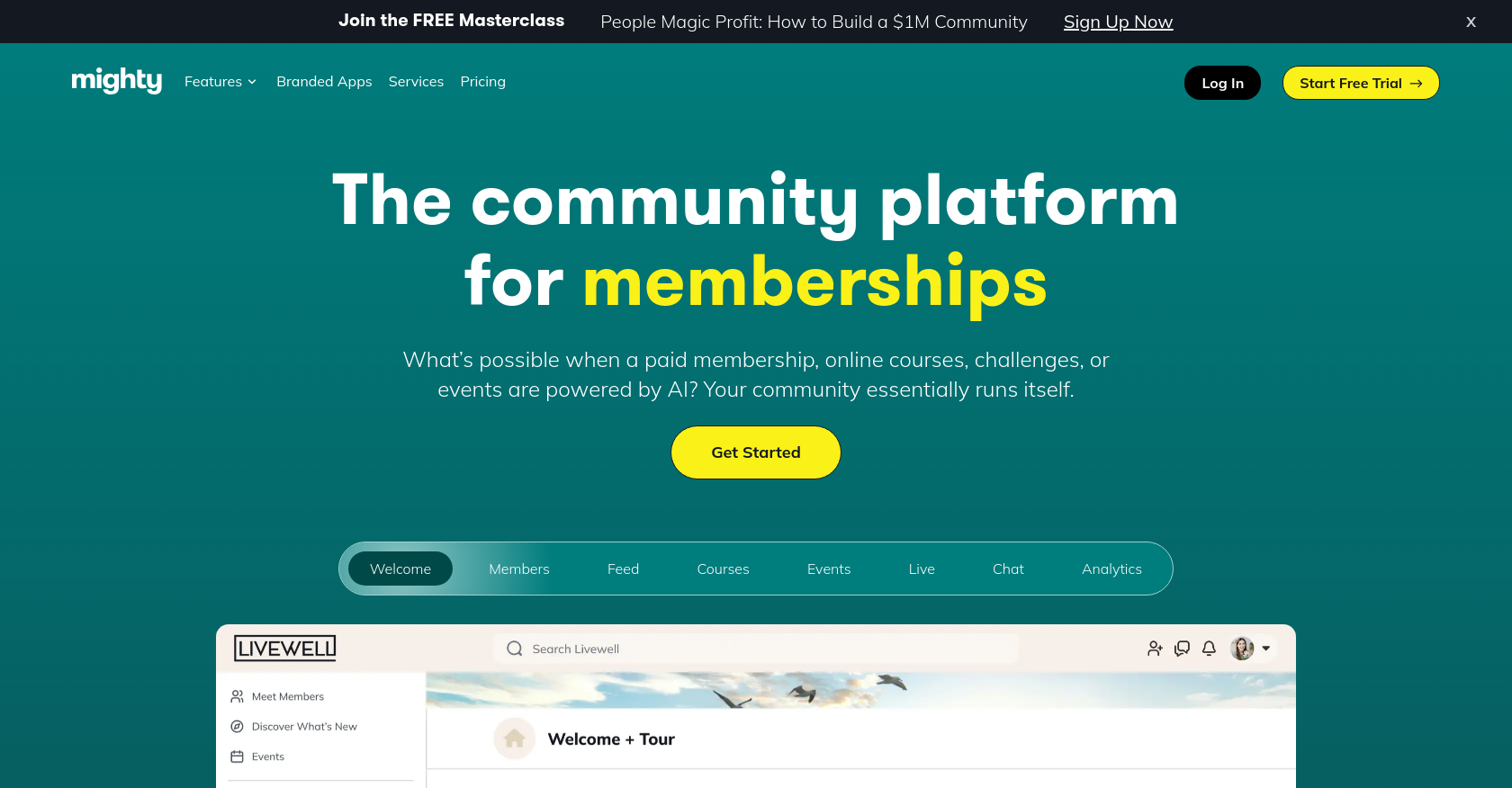
Overview
Mighty Networks positions itself as a platform designed to prioritize connection and interaction within learning communities. Its mobile-friendly approach makes it easy for members to stay engaged, while monetization tools allow organizations to efficiently turn their offerings into revenue.
Built for creators and community leaders, Mighty Networks focuses on fostering authentic engagement through features like activity feeds and subgroups, ensuring that collaboration and shared learning remain at the heart of every experience.
Key Features
Mighty Networks blends functionality with customization, offering tools that make it simple to build a branded, interactive learning environment. Features like in-app courses and events allow training programs to integrate education and engagement seamlessly. Its membership tiers provide flexible revenue models, giving creators options for subscriptions, one-time fees, or bundled access.
The platform’s dedicated mobile apps ensure that learners and community members can participate on their own schedules, while branding customization lets organizations align the experience with their unique identity.
3. Kajabi
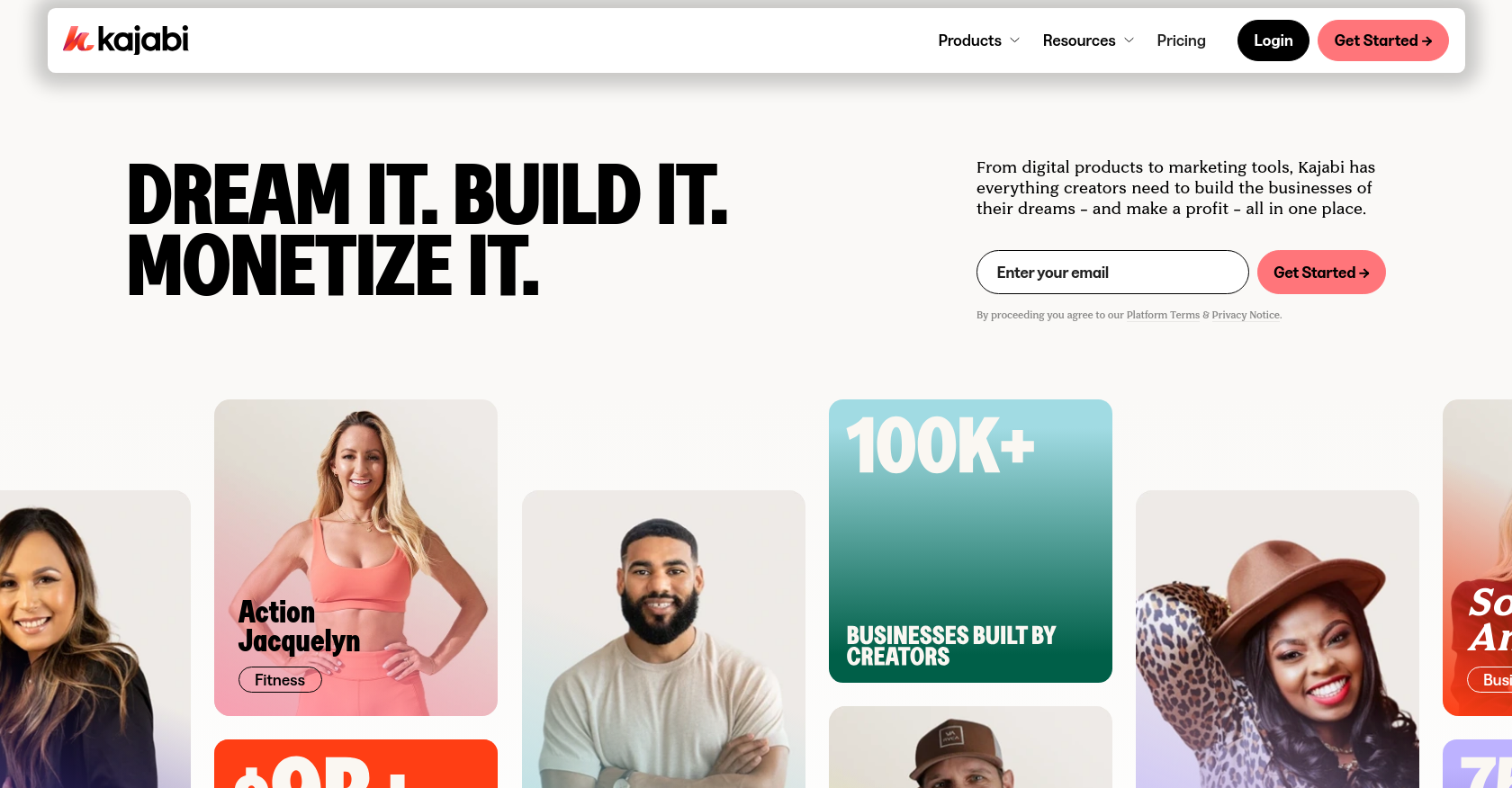
Overview
Kajabi is designed to simplify how businesses create, market, and sell online courses. By combining tools for course creation, email marketing, and community hosting, it provides a centralized platform for building and scaling digital learning programs. Its standout feature is its focus on marketing automation, offering pre-built funnels and campaigns that help creators streamline their outreach and engagement efforts.
While Kajabi delivers a polished experience for selling courses and memberships, its community features remain fairly basic, emphasizing simplicity rather than deep interactivity. It’s a platform that works well for creators who want an all-in-one solution with a strong foundation in sales and marketing.
Key Features
Kajabi’s course builder uses intuitive templates to help creators launch programs quickly, while its integrated email marketing tools enable seamless communication with learners. The platform also supports payment and subscription options, making it easy to generate recurring revenue.
For those focused on branding, Kajabi includes customizable web templates that tie everything together into a cohesive online presence. Its community functionality offers fundamental tools for learner interaction, though it’s best suited for creators who prioritize content delivery over collaborative learning.
4. Circle
Circle offers a focused approach to building online communities by prioritizing simplicity and structure. It’s designed for organizations that value clean, organized spaces for discussions while incorporating lightweight course features to enhance engagement.
Key Features
At the heart of Circle’s platform is its Spaces and Sub-Spaces system, which provides a flexible way to organize communities into distinct groups. Whether you’re hosting open discussions or exclusive member areas, this structure helps streamline interactions and keeps everything accessible.
To support ongoing connection and collaboration, Circle integrates real-time chat tools alongside automation capabilities that simplify community workflows. For brands looking to maintain a cohesive identity, features like custom domains and branding options allow for seamless personalization.
Circle also emphasizes accessibility, with a mobile-friendly interface that ensures learners can stay engaged from anywhere. For businesses exploring monetization, it facilitates payment gateway integrations, making it easy to create paid memberships or offer premium courses.
5. Teachable

Overview
Teachable is built for creators looking to transform their expertise into structured, sellable learning experiences. It’s a platform that emphasizes simplicity, offering tools to help solo instructors and small teams design courses without technical barriers. By combining course creation with basic community features, Teachable focuses on providing an accessible entry point for smaller-scale programs.
Key Features
Teachable equips creators with a streamlined system for building and delivering courses. The platform includes integrated payment processing and automated tax handling, making operational tasks seamless. For learner engagement, Teachable offers simple quizzes and discussion forums to support interaction and comprehension during the learning journey.
Additionally, the platform handles instructor payouts automatically, taking the complexity out of managing revenue. For those looking to scale modestly while keeping processes efficient, Teachable’s tools ensure a smooth and focused course delivery experience.
6. Podia
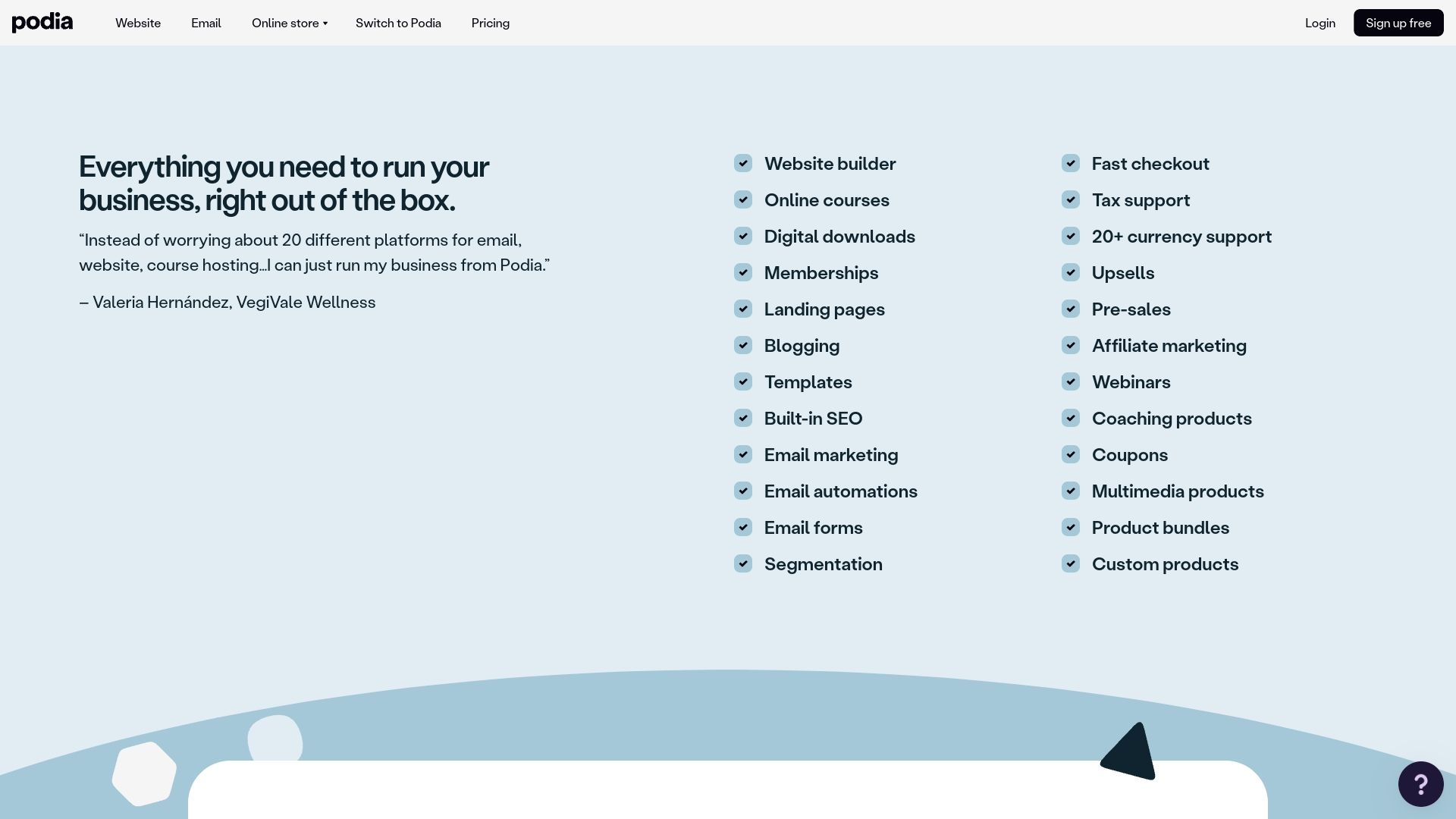
Overview
Podia is built for creators and small businesses looking to transform their expertise into digital storefronts. Whether it’s courses, memberships, or downloads, Podia simplifies the process, wrapping it all in a sleek, user-friendly package. The platform is designed to help beginners and seasoned entrepreneurs alike create polished, professional experiences without the need for technical skills.
Podia’s strength lies in its ability to centralize tools for selling and audience engagement. It’s not just a store—it’s a foundation for building relationships, growing your brand, and delivering value through well-crafted digital products.
Key Features
Podia’s Unified Storefront ensures that all your offerings—courses, coaching, webinars, and more—are available in one seamless space. The platform also integrates email marketing, making it easy to communicate with your audience while automating routine tasks like follow-ups and announcements.
For creators keen on personal touchpoints, Podia offers live messaging, enabling direct interaction with learners for real-time support or engagement. Additional features like bundles and memberships allow you to package your offerings creatively, while custom branding and domain options ensure your business maintains its unique identity at every touchpoint.
7. Discourse
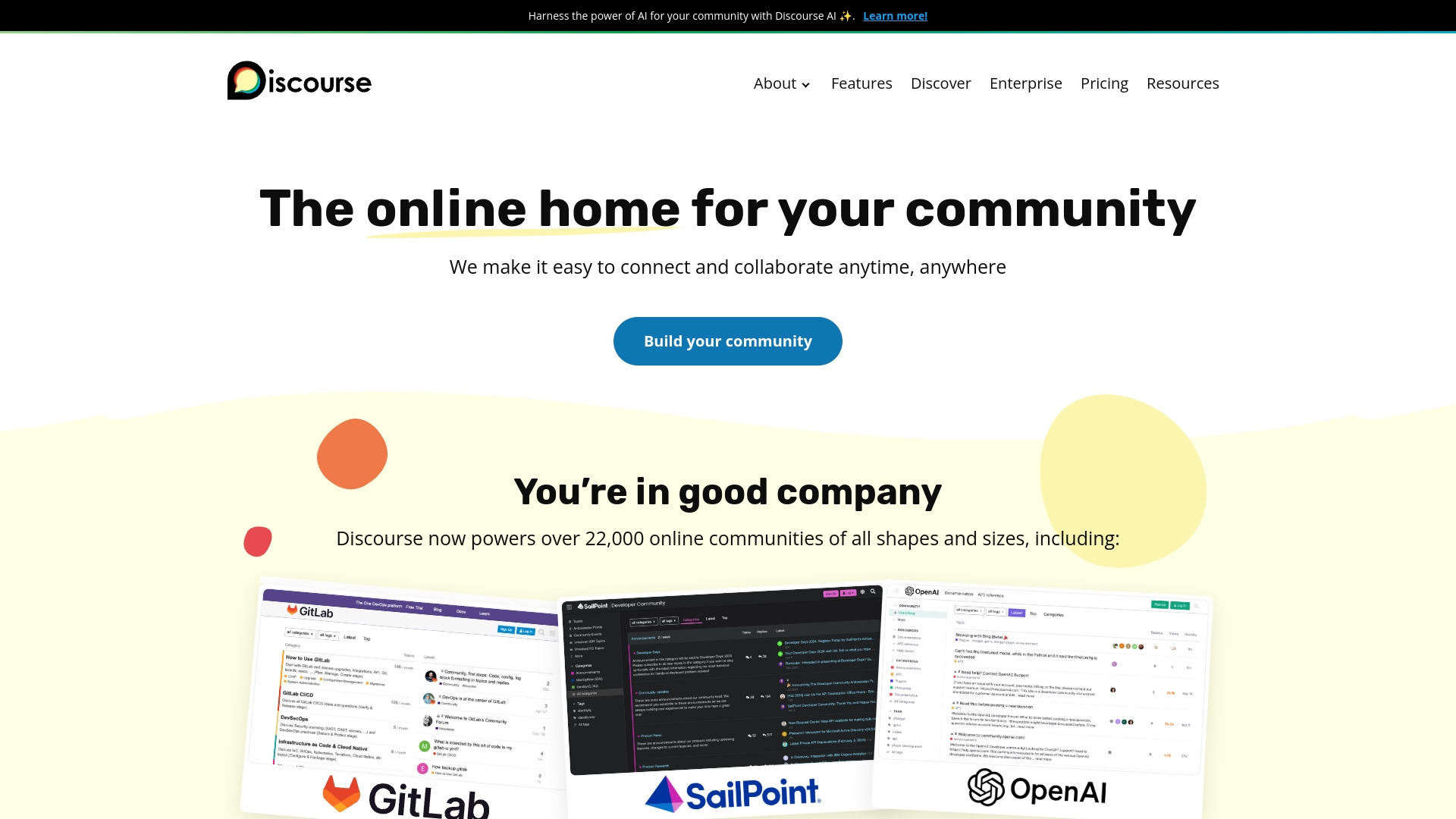
Overview
Discourse reimagines community forums as vibrant spaces for organized, threaded conversations. Built as an open-source platform, it gives organizations the tools to create dynamic discussion hubs with a level of customization that adapts to their unique needs. For teams and businesses looking for more than just a standard forum, Discourse offers the flexibility of self-hosting along with a developer-friendly ecosystem.
Its design caters to meaningful, structured dialogue—perfect for teams prioritizing clarity and scalability in their community spaces. With a balance of advanced features and usability, Discourse empowers organizations to foster conversations that feel intuitive and productive, no matter the scale or complexity of their audience.
Key Features
Discourse transforms online discussions with its threaded conversation structure, which makes it simple to follow even the most in-depth topics. Organizations can extend the platform’s capabilities through plugin integrations and custom themes, tailoring the experience to their branding or functional requirements.
For those who prefer flexibility, Discourse supports both cloud-hosted and self-hosted options, ensuring that teams can choose the setup that aligns with their resources and goals. Its mobile-responsive interface ensures discussions are accessible on any device, while moderation tools provide admins with the power to maintain an inclusive, well-organized community space.
8. TalentLMS

Overview
TalentLMS is built for businesses aiming to simplify and scale professional training. It’s designed to manage structured programs of all sizes, from onboarding new hires to extended enterprise training. With features like quizzes, certifications, and analytics, TalentLMS helps teams deliver impactful learning experiences while staying organized.
What sets TalentLMS apart is its global accessibility. Multi-language support enables organizations to connect with learners worldwide, while its reporting tools provide precise insights into performance, helping leaders make adjustments that drive results.
Key Features
TalentLMS combines flexibility with depth. Its assessment tools and gamification features keep learners engaged and motivated, while e-commerce functionality makes it easier to monetize content. Organizations can bundle courses, offer discounts, and manage subscriptions seamlessly.
With integrations like Zoom and built-in payment gateways, TalentLMS connects effortlessly with existing workflows. And for those who rely on data, the platform’s customized reports offer clarity and actionable feedback, helping teams continuously refine their programs.
9. Slack
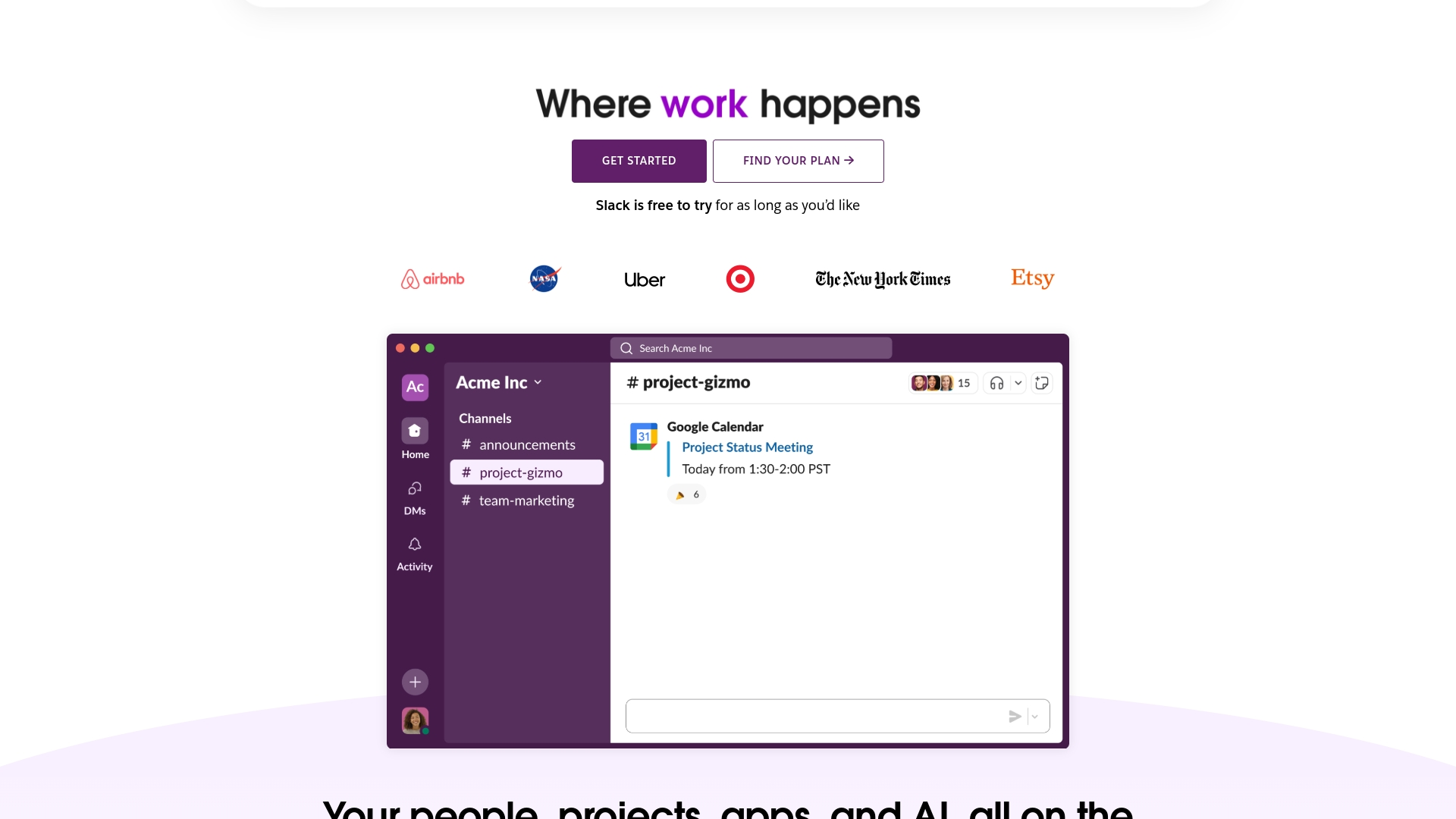
Overview
Slack redefines communication at work, and its flexibility has made it a favorite for group-based training. What stands out is its ability to bring people together through channels and threads, making it easier to structure conversations and keep discussions focused. While Slack isn’t designed as a full-scale learning platform, its capability to encourage collaboration and interaction makes it a valuable tool for dynamic training environments.
Key Features
Slack thrives on keeping communication seamless. Its channel-based structure allows you to organize discussions around specific topics or projects, ensuring that learners know exactly where to go for relevant conversations. The direct messaging system and search functionality make it easy to connect with peers or retrieve important information quickly, even in sprawling workspaces.
Collaboration goes beyond text with real-time file sharing, video and audio calls, and integrations with thousands of tools, from Google Drive to Trello. For trainers, this means creating a unified space where learning materials, discussions, and project updates flow together effortlessly. And with optional AI-driven features like conversation summaries and workflow automation, Slack provides a boost to both productivity and focus.
10. Discord
Discord has emerged as a vibrant communication hub for teams and communities looking to stay connected in real time. For training organizations, it offers an informal but powerful way to foster collaboration through voice, video, and text interactions. While it doesn’t function as a traditional learning management system, Discord is well-suited for groups that value dynamic, conversational engagement over structured, curriculum-driven tools.
Key Features
Discord’s voice, video, and text channels enable seamless interaction, whether you’re hosting live Q&A sessions, facilitating group discussions, or providing quick feedback. Its custom roles and permissions allow training leaders to manage communities with precision and flexibility, assigning responsibilities or creating exclusive spaces for specific learner groups.
For live demonstrations, Discord’s screen-sharing feature supports interactive tutorials, while bot integrations can help automate repetitive tasks like event reminders or resource sharing. The platform’s core functionality is available at no cost, with optional Nitro plans unlocking extras such as HD video streaming, longer messages, and enhanced customization options for those who want to elevate their community experience.
Moving Forward
Modern training communities are evolving, and the tools to build them are evolving even faster. Each platform today is designed to address a unique set of challenges, from simplifying course creation to fostering deeper and more dynamic engagement. The results? More meaningful learning experiences and better outcomes for learners.
AI, in particular, is reshaping how we think about personalization, scalability, and efficiency. Platforms like Disco bring this vision to life with tools that not only streamline operations but also elevate the learning journey itself. Whether you’re looking to scale your programs or strengthen your branding, the key is finding a platform that aligns with your goals and adapts as you grow.









